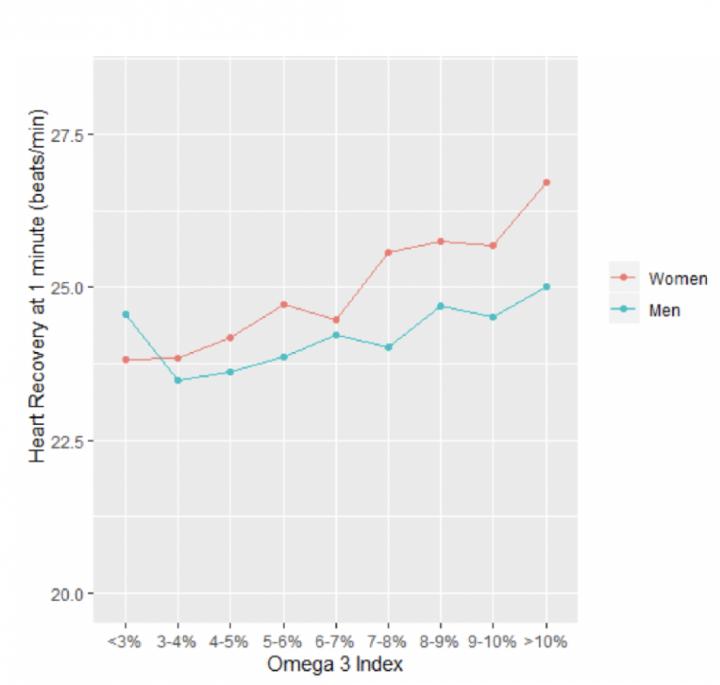
Credit: Fatty Acid Research Institute
The Fatty Acid Research Institute (FARI) has published a new research paper in conjunction with The Cooper Institute on omega-3s and heart rate recovery.
Omega-3 fatty acids have a long history of being “heart healthy” but exactly why and how has been less clear. They are known to lower serum triglyceride levels, but the effect is relatively small and it’s not clear how much of a risk factor high triglyceride levels is in the first place. So how do the omega-3 fatty acids EPA and DHA work?
A recent study1 from the Cooper Center Longitudinal Study (CCLS) and FARI sheds new light on this question.
The investigators utilized data from 13,912 healthy men and women who had preventive medical examinations at Cooper Clinic in Dallas over a 10-year period. These examinations routinely included both treadmill exercise testing and measurement of the Omega-3 Index (i.e., red blood cell EPA+DHA levels from OmegaQuant Analytics).
One component of the exercise test is called “heart rate recovery” and it refers to how quickly the heartbeat slows down after maximal exercise. The faster it drops, the healthier the heart.
Comparing each patient’s heart rate recovery with their Omega-3 Index, the researchers found a significant relationship between these two variables such that the higher the Index, the faster the heart rate dropped down. The effect was more marked in women than men, but statistically significant in both. This is summarized in the Figure 1 (right) where the Omega-3 Index is plotted on the x-axis, and the drop in heart rate one minute after stopping the treadmill test (measured in beats per minute, bpm) is shown as a positive number on the y-axis. These are the unadjusted values. (For example, 25 bpm on the y-axis means that 1 minute after stopping exercising — i.e., the maximal heart rate — the person’s heart rate dropped by 25 bpm).
When adjusted for age, maximal METS (a measure of cardiorespiratory fitness), BMI and smoking status, a 2-percentage point higher Omega-3 Index was associated with a 0.35 and 0.69 bpm greater heart rate recovery in men and women, respectively (p
Previous studies2 have shown that a slow heart rate recovery is associated with increased risk for sudden cardiac death, which fits with higher EPA and DHA levels being linked with reduced risk for sudden cardiac death3.
Dr. William Harris, President of FARI and co-inventor of the Omega-3 Index, who was also an author on the study, commented on the implications of this research. “These new findings from the CCLS harmonize with the known benefits of omega-3 fatty acids on resting heart rate and provide new clues to how these important fatty acids can preserve cardiac health,” he said.
“These benefits on cardiac autonomic tone join other cardioprotective effects of omega-3 fatty acids, including the reduction in blood pressure, chronic inflammation and platelet aggregation, to at least partially explain why omega-3s are good for the heart. Future treatment studies should define the omega-3 intake (and Omega-3 Index) that optimizes this aspect of cardiac function.”
Dr. James H O’Keefe, MD, a cardiologist and Medical Director of the Charles and Barbara Duboc Cardio Health & Wellness Center at Saint Luke’s Mid America Heart
Institute in Kansas City, MO, and a Professor of Medicine at the University of Missouri-Kansas City (who was not involved with the study) remarked that this
research provides “strong data supporting the robust cardiovascular benefits of omega-3 fatty acids.”
###
Media Inquiries:
Bill Harris, President, FARI
Email: [email protected]
Phone: +1-913-302-9433
Website: http://www.
References:
1. Farrell, S.W., et al. Higher omega-3 index is associated with more rapid heart rate recovery in healthy men and women. Prostaglandins, Leukotrienes and Essential Fatty Acids 163, 102206 (2020).
2. Hernesniemi, J.A., et al. Cardiorespiratory fitness and heart rate recovery predict sudden cardiac death independent of ejection fraction. Heart 106, 434-440 (2020).
3. Siscovick, D.S., et al. Dietary intake and cell membrane levels of long-chain n-3 polyunsaturated fatty acids and the risk of primary cardiac arrest. JAMA 274, 1363-1367 (1995).
About the Fatty Acid Research Institute (FARI)
The Fatty Acid Research Institute (FARI) is a non-profit research and education foundation. FARI was founded in order to accelerate discovery of the health effects of fatty acids, most notably, the long chain omega-3 fatty acids EPA and DHA. FARI researchers and scientists will focus single-mindedly on publishing high-quality research studies on the multiple relationships between fatty acid levels and human (and animal) health outcomes. These studies will improve the ability to predict risk for disease, and more importantly, suggest ways to reduce risk by changing our diets and/or supplementation regimens. http://www.
About The Cooper Institute
The Cooper Institute is dedicated to promoting life-long health and wellness worldwide through research, education and advocacy. Founded in 1970 by Kenneth H. Cooper, MD,
MPH, The Cooper Institute translates the latest scientific findings into proactive solutions that improve public health. Key areas of focus are research, education and advocacy.
Through these initiatives, The Cooper Institute helps people lead better, longer lives now and “Well. Into the Future.” cooperinstitute.org
Media Contact
Becky Wright
[email protected]
Related Journal Article
http://dx.




